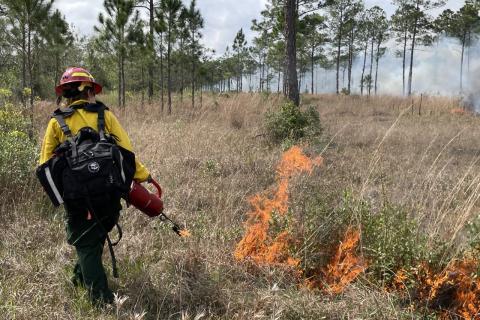Wildland fire crews from the U.S. Fish and Wildlife Service Gulf Coast Complex Grand Bay National Wildlife Refuge Student Conservation Association recently burned 187 acres of mixed forest, shrub and grass lands as part of ongoing fire management activities at the refuge. In fact, slightly more than 600 acres of Grand Bay National Wildlife Refuge have been treated with prescribed fire this spring to support the Grand Bay Land Acquisition and Habitat Management project.
This project will restore and enhance marine, coastal, estuarine, and riparian habitats for the benefit of resources injured by the Deepwater Horizon oil spill. The project includes the acquisition of up to 8,000 acres and management of up to 17,500 acres within the boundaries of the Grand Bay National Wildlife Refuge, Grand Bay National Estuarine Research Reserve, and Grand Bay Savanna Coastal Preserve in Jackson County, Mississippi. To date, the State of Mississippi has acquired approximately 1,530 acres as part of this project, 40 of which were acquired as recently as April 2023, and acquisition is ongoing. Management activities began in 2018 and are expected to continue for the next 10 years.
The primary objective of habitat restoration is to re-establish native vegetation in the target habitats, including coastal marsh, savannas and flatwoods, forested freshwater scrub-shrub, and freshwater marsh.
Prescribed fire is just one restoration measure used by the Mississippi Trustee Implementation Group to implement this project. Other measures include invasive species management, mechanical clearing, and chemical treatment.
Naturally occurring fire historically played an important role in maintaining the natural habitat of the Central Gulf ecosystem’s long-leaf pine and pine savannas, such as those found in Grand Bay. that were once prevalent along the Gulf Coast from Louisiana to Alabama. However, a decrease in naturally occurring fires has caused ecosystem degradation including reduction in the quality of wildlife habitat. Prescribed fire promotes the growth of trees, wildflowers, and other plants, removes unwanted species that threaten native species, and recycles nutrients back to the soil. Re-establishing the natural habitat will increase the health and viability of local, endangered, and threatened species, such as the Mississippi sandhill crane and gopher tortoises, which are found within the Grand Bay
We also send updates out via email. If you haven't already, please take the opportunity to sign up for e-mail updates today to receive the latest news from all the Deepwater Horizon Trustees.


